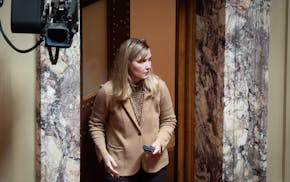The state's economic recovery has been so robust that state leaders are able to pay down a giant share of the remaining debt to E-12 public schools, Gov. Mark Dayton announced Monday.
"This is a great success," Dayton said. "It's a tribute to Minnesota's economy and its employers and its employees."
Minnesota will repay another $636 million to public schools, about $200 million more than predicted in July. The additional money came largely from unexpected savings in state spending, largely health and human services costs. The state's balance to schools is just $238 million.
Dayton and DFL legislative leaders made the announcement at a Capitol news conference, highlighting what they say is the freshest sign that the state has nearly crawled out of the worst recession since the Great Depression. The last economic downturn resulted in deep cuts in most areas of the budget, drained reserves and caused government leaders to resort to accounting shifts and borrowing from schools to balance the budget.
Republicans say the state's economic rebound came as a result of the budgets that they crafted and fought for, not Dayton. They said that their insistence on not raising taxes kick-started the economic recovery and allowed the state to pay off schools faster. This is the same budget that led Dayton and Republicans to lead the state into a three-week partial government shutdown.
Senate Minority Leader David Hann, R-Eden Prairie, said the positive outcome of this budget was worth the acrimonious standoff with Dayton, even though it might have cost them majorities in the House and Senate in the next election.
"I think the long term effects are beneficial," Hann said."No one likes to see a government shutdown, nobody likes to see the debate come to a place it got to, but what we are adamant about at that point is that we did not want to increase the tax burden on this economy."
Rather than impose deeper cuts or raise taxes, state leaders withheld $2.8 billion in school payments to balance the budget over the last two budget cycles. The lower payments caused cash-flow problems for some school districts, which had to borrow money to cover their financial obligations.
State law now requires any surplus to first go to repay any school debt. Only then can the money can be used to increase government spending or lower taxes.
Dayton and a new slate of DFL legislative leaders approved a new two-year budget that includes about $2.1 in new taxes, mostly in the form of higher income taxes for the state's top earners and three new businesses taxes.
The Latest | New witnesses set to take the stand as Trump hush money trial enters its 13th day

